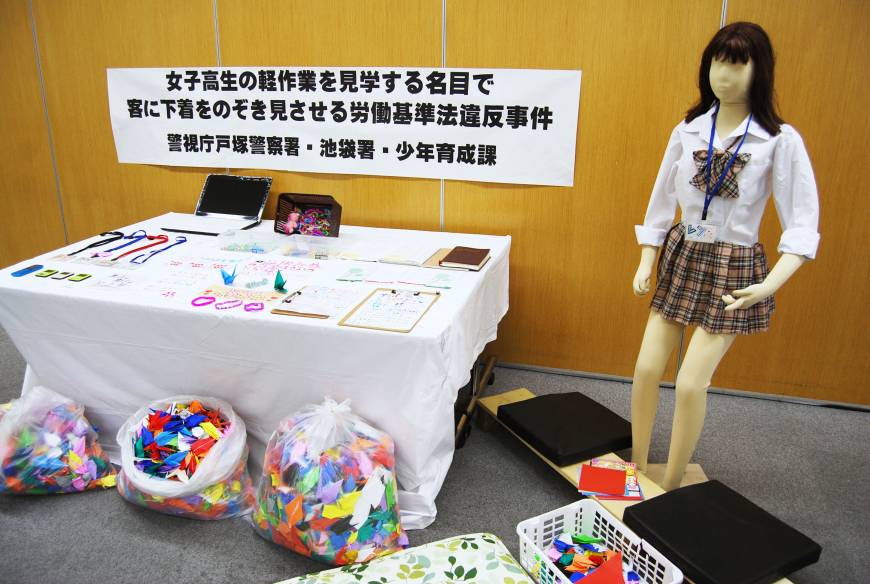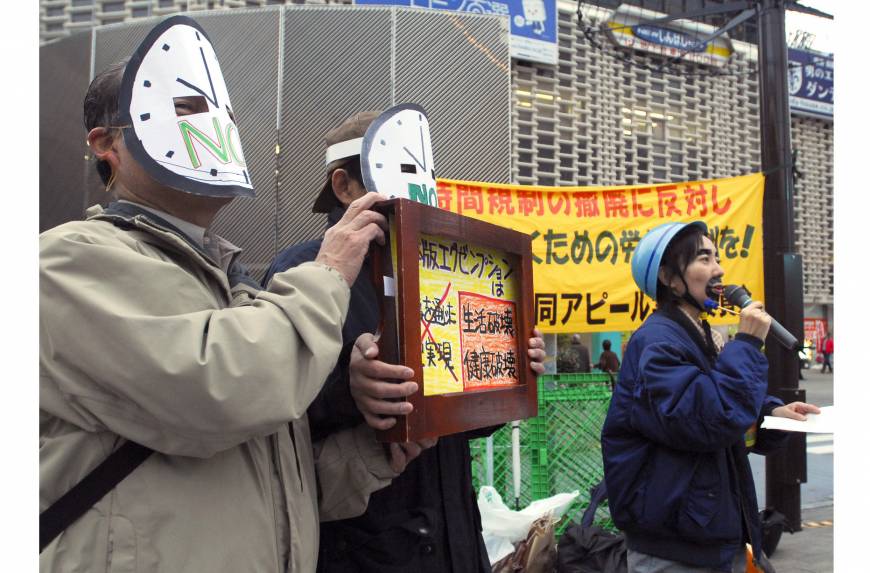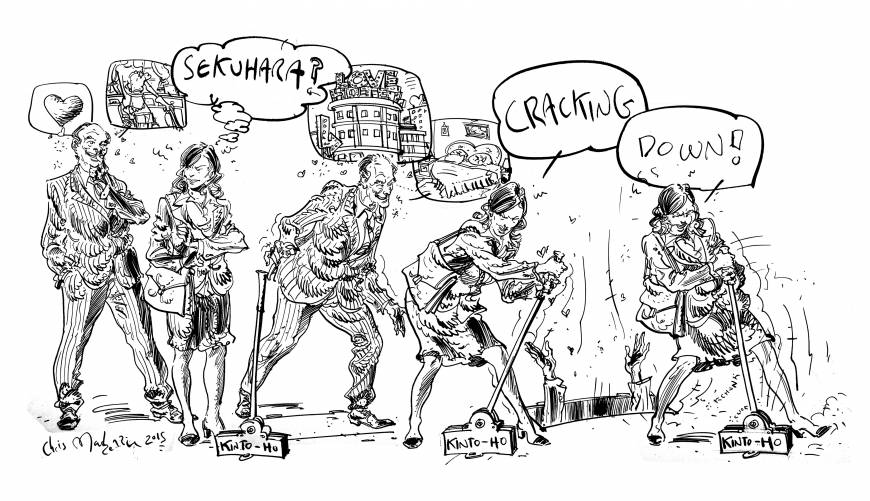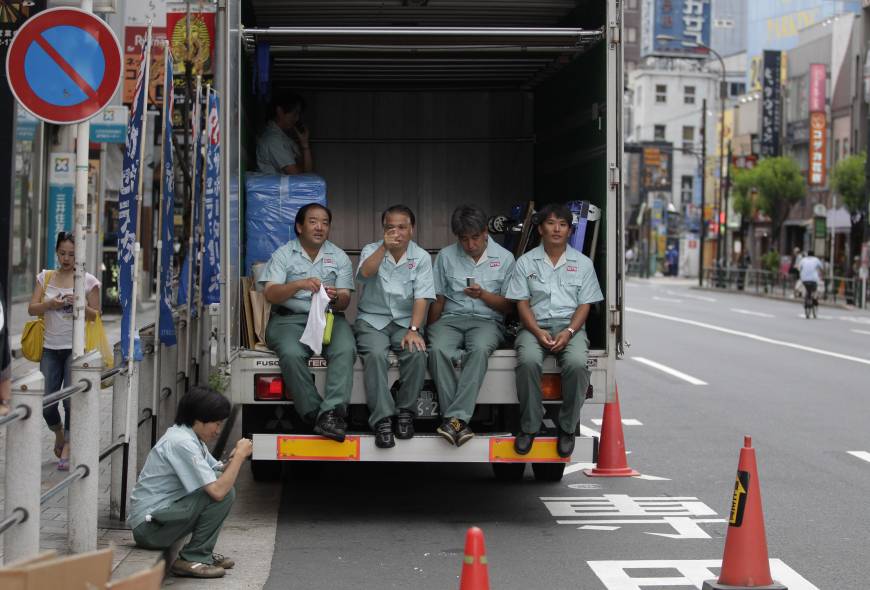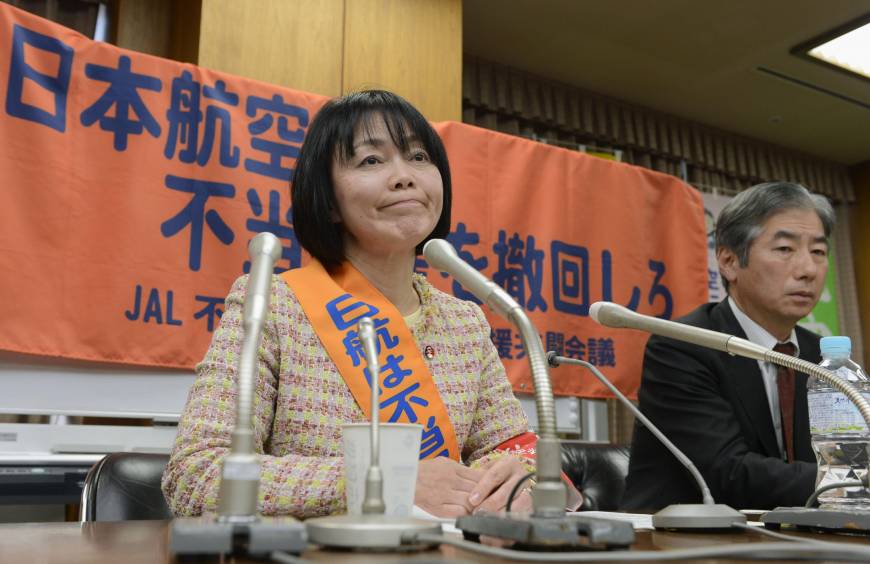Summer 2015 — 70 years since Japan’s defeat in World War II. Prime Minister Shinzo Abe and his ruling coalition have rammed two security bills through the Lower House that overturn decades of interpretation of the Constitution by enabling Japan to engage in collective self-defense. Now he hopes to do the same in the Upper House.
labor pains
Three amigos on a mission to protect your rights
The only people who tend to know what I’m talking about when I say the words “labor relations commission” are unionists, labor or corporate lawyers and labor-law scholars. These panels are government enforcement bodies that lack the glamour and fame of the courts, the cops and even the Labor Standards Office, and sound about as dull as dish water. This is a shame, because in actual fact, they do some amazing work. Let me explain.
Has striking in Japan become extinct?
“Strike.”
Dear reader, what do you think when you hear this word? What impression do you get? Do you see the blood, sweat and tears? Do you see an angry, vicious mob disturbing our civil society? I bet a majority of Japanese people under the age of 40 have neither a positive nor negative impression of strikes. They have no impression at all and no idea about what a strike is because strikes have become rarer in modern Japanese society. This, however, hasn’t always been the case.
Society helps sustain Japan’s sordid sexual trade in schoolgirls
BY HIFUMI OKUNUKI
‘Zero Overtime Bill’ is the thin end of the wedge for workers’ rights
Takuboku Ishikawa died in 1910 at the tender age of 26. But before he left this world, he penned the following famous tanka:
働けど
働けどなお
我が暮らし
楽にならざり
じつと手をみるHatarakedo
Hatarakedonao
waga kurashi
raku ni narazari
jitto te wo miruStaring at my hands
I toil and toil
yet my life gets no easier
Bewildered by his predicament, Takuboku found himself staring at the hands that connected him both physically and spiritually to his work.
過労死をいっそう促進する「残業代ゼロ制度」はどう考えればいい
働けど
働けどなお
我が暮らし
楽にならざり
じつと手をみる
1910(明治43)年に26歳で夭逝した歌人の石川啄木による、あまりにも有名な短歌である。「どれだけたくさん働いても、一向に暮らしは楽にならないのはなぜだろう? 途方に暮れて、思わずじっと自分の手を見つめてしまう・・・」という意味である。
啄木は若き才能あふれる文学者であったが、生前はその才能が世間になかなか認められず、代用教員や校正など、生活のために様々な職に就いていた(ちなみに、彼は周囲の人に借金をしまくっており、しかもその返済をしなかったという)。ただし、啄木は肉体労働には就いていなかったので、「じつと」見つめていた手は、きっと赤剥けもささくれもなく、細く白かったのだろうと推測できる。
「ちゃんと休ませてくれ!」―労働法における「休憩」って?
労働法と一言でいっても、そのなかには、さまざまな個別のテーマがある。たとえば、賃金、労働時間、配転、人事評価、解雇、営業譲渡、労働災害などなど。そのなかでも、あまり重きを置かれていないものに「休憩」がある。労働法の体系書を見ても、「休憩」に割くページ数は、他のテーマに比べるとかなり少ない。そもそも「労働」法とは、まさに「働くこと」がメインの法律なのだから、その対極にある「休むこと」については、あまり重視されていないのだろうか?
Under Japanese law, breaks are sacred and standby counts as work
Labor law covers a great deal of territory, from wages, work hours, transfers and performance evaluation to dismissals, selling of business rights and industrial accidents. One subject often overlooked is break time or kyūkei. My labor law encyclopedia devotes far fewer pages to this subject than just about any other topic. It is, after all, labor law, not “rest law.”
空の労働者、JAL165名不当解雇の闘いに連帯を
~原告団長内田妙子さんインタビュー~
2010年大晦日。世間の多くの人びとは、慌ただしく新年を迎える準備をしながら、ワクワクと心躍らせていたことだろう。そんななか、日本屈指の航空会社、鶴のトレードマークで有名なJAL(日本航空)で働く165名の労働者らは、大晦日に会社からクビを切られた。パイロット81名と客室乗務員84名。長年、誇りと情熱をもって空の安全を守るために仕事に従事してきた彼らは、なぜ、大晦日に仕事を奪われなければならなかったのだろうか。




